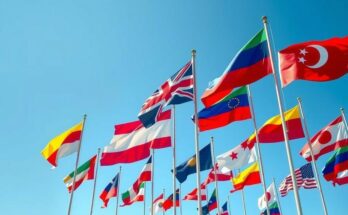Former President John Dramani Mahama has won the Ghanaian presidential election, defeating NPP candidate Mahamudu Bawumia amid widespread economic dissatisfaction. Mahama’s victory signifies a shift in voter sentiment, as economic crises marked by high inflation and a debt default influenced the electorate. The NPP’s eight years in power have concluded as Mahama embarks on his third term after previous electoral setbacks.
Former President of Ghana, John Dramani Mahama, has achieved a momentous electoral victory, marking his return to power amidst an economic crisis that has afflicted the nation. This triumph follows a challenging period for the ruling New Patriotic Party (NPP), whose candidate, Vice President Mahamudu Bawumia, conceded defeat shortly after the weekend elections. The impact of soaring living costs and economic instability heavily influenced voters’ decisions, resulting in Mahama’s success in his third presidential bid after previous defeats in 2016 and 2020.
The NPP’s inability to address Ghana’s economic challenges, characterized by high inflation and a recent debt default, played a significant role in the electoral outcome. President Nana Akufo-Addo’s administration faced scrutiny as it led the country through a time of financial strife, resulting in a $3 billion IMF bailout. Following the election, Bawumia acknowledged the people’s desire for change, stating, “The people of Ghana have spoken, the people have voted for change at this time and we respect it with all humility,” before reaching out to Mahama to extend his congratulations.
As celebrations erupted outside the National Democratic Congress (NDC) headquarters in Accra, Mahama confirmed Bawumia’s congratulatory call, illustrating the democratic spirit of the nation. Preliminary internal reviews indicated Mahama secured 56.3% of the vote, compared to Bawumia’s 41.3%. While official results are anticipated from the electoral commission, the political landscape in Ghana reflects the citizens’ response to the economic priorities of their leaders. The duality of frustration with Mahama’s past governance—marked by significant power outages—against the backdrop of current economic hardship sets the stage for his next term in office.
Ghana has a longstanding reputation for democratic stability, with a political system that alternates power between its two main parties, the NPP and the NDC, since returning to multiparty politics in 1992. The recent election is significant not only for Mahama’s personal history as a former president but also for the nation’s economic context. Ghana is currently grappling with critical economic issues, including high inflation rates and fiscal instability that have led to an IMF bailout. Understanding the electorate’s priorities against this backdrop is crucial to interpreting the election results and the broader implications for governance in Ghana.
In conclusion, John Dramani Mahama’s electoral victory marks a pivotal shift in Ghana’s political landscape, driven largely by public dissatisfaction with the current government’s handling of the economy. The election has underscored the pressing economic concerns of the electorate, illustrating a desire for a change in leadership. As Mahama prepares to navigate this complex situation, he faces the dual challenge of addressing past criticisms while striving to implement effective policies aimed at revitalizing the nation’s economic health.
Original Source: www.theguardian.com




